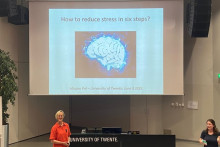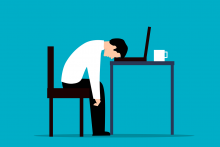Pol is a student advisor at the Royal Academy of Arts in The Hague and author of the book ‘From stress to success’. She was invited to speak during the UT’s wellbeing weeks. Her book offers six steps towards becoming stress free of which she presented three in the lecture. The lecture, attended by only ten students, offered perspective on navigating the turbulent waters of academic pressure.
Many facets
On the topic of stress, Mirjam Pol emphasized that stress has many facets. ‘Stress is a network of behaviours, thoughts and feelings, sometimes one of which is more pronounced.’ According to Pol, very often negative thoughts can elevate stress in students. 'Common examples include thinking they are not good enough and that they will not make it.’
Pol believes that stress caused by these thoughts can affect the body in a negative way. 'Stress can affect the muscles, the tension in the muscles, the chest, the heart and lead to headaches and insomnia.’ Especially when studying or doing or other university-related tasks, unhealthy stress is a major burden, Pol said. 'Stress hinders learning because a stressed brain is not a learning brain. If you are chronically stressed, the first step should be to relax before going back to the task at hand.’
Three steps
To overcome a stressed state, Pol explained three simple steps to become more stress-free. The first step is reflection on stress. ‘When you are stressed, use your metacognition to look at yourself, put yourself in your brain and body and observe the stress. Often we tend to think that we are our thoughts, but in reality we are the ones 'thinking' those thoughts. The first step is to find out what event is stressing you and with what feelings, thoughts and behaviours you are reacting to this situation.’
The second step is to find out what feelings, thoughts and behaviours are exhibited in the desired stress-free state. ‘We now need to figure out what we want to feel, what we want to think, and what we want to do. You can travel in your mind to a place in the future where the desired feelings and thoughts are true.’ According to Pol, this then creates positive feelings inside. 'When things go well, you can feel a smile on your face because you feel better about yourself. However, this is not a solution for serious, long-lasting stress patterns.’
The third step is all about having a clear plan of exercises one can do on a regular basis to decrease stress, said Pol. ‘There are a great number of exercises you can do to overcome stress, which exercise suits you best depends on you as a person.’ Pol showed a slide with a list of different exercises. The first thing she mentioned was self-talk. ‘When you face obstacles, you can say phrases to yourself that build you up. The strategy of positive self-talk has been shown to be effective, for example with top athletes who use this technique frequently.’
Patience
She also outlined the technique of thought parking. ‘Take your notebook and write down your negative feelings and park them in your notebook. Once you get into the habit, those thoughts will stay in the notebook. When you park your thoughts in this way, you find it easier to observe stressful thoughts more objectively.’
Pol indicated that becoming more stress-free is a process that requires time and patience, which she illustrated with the Kaizen philosophy. ‘Kaizen is the Japanese wisdom of achieving great things in small steps, which should also be the approach in this context. I believe we need to take small, consistent steps to eventually achieve a stress-free state of mind.’








